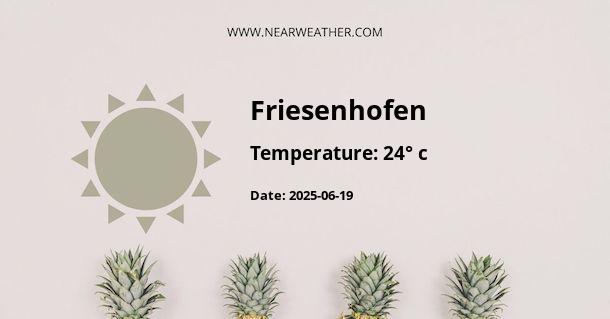Friesenhofen, Germany: Climate and Weather Year Round
Friesenhofen is a charming village located in the state of Bavaria, Germany. Situated in the Allgäu region, Friesenhofen is known for its picturesque landscapes, rolling hills, and rich cultural heritage. Understanding the climate and weather patterns of Friesenhofen is essential for both residents and tourists planning their visit. In this comprehensive guide, we will delve into the climate of Friesenhofen throughout the year, providing detailed information and insights to help you plan accordingly.
Geographical Factors
Friesenhofen is nestled in the foothills of the Alps, which significantly influences its climate. The village is located at an altitude of approximately 700 meters (2,300 feet) above sea level. This elevation contributes to cooler temperatures and unique weather patterns compared to lowland areas.
The surrounding topography, characterized by rolling hills and meadows, also plays a role in shaping Friesenhofen's climate. The village enjoys a relatively sheltered position, benefiting from protection against strong winds and extreme weather conditions.
Seasonal Overview
Spring (March - May): Springtime in Friesenhofen is a delightful season as nature comes alive with vibrant colors. Average temperatures range from 5°C to 15°C (41°F to 59°F) during this period. However, it's important to note that the weather can be variable, with occasional cold spells and late-season snowfall.
Summer (June - August): Summers in Friesenhofen are typically mild and pleasant, making it an ideal time to explore the outdoors. Average temperatures range from 15°C to 25°C (59°F to 77°F), with July being the warmest month. The region experiences moderate rainfall during this season, which helps maintain the lush greenery of the surrounding landscape.
Autumn (September - November): Autumn brings a tapestry of colors to Friesenhofen as the leaves change from vibrant greens to stunning hues of red, orange, and gold. Average temperatures range from 5°C to 15°C (41°F to 59°F), gradually cooling down as the season progresses. Rainfall increases during the autumn months, providing the necessary moisture for the region's agriculture and forestry.
Winter (December - February): Winters in Friesenhofen are characterized by cold temperatures and occasional snowfall. Average temperatures range from -5°C to 5°C (23°F to 41°F). The village often experiences a beautiful winter wonderland, making it a popular destination for winter sports enthusiasts. The surrounding mountains offer excellent skiing and snowboarding opportunities.
Precipitation
Friesenhofen experiences a moderate amount of precipitation throughout the year, with an annual average of approximately 1,000 millimeters (39 inches). The distribution of rainfall is relatively even, with slightly higher amounts during the summer months. This consistent precipitation contributes to the region's lush vegetation and thriving agricultural activities.
It's worth noting that Friesenhofen, like many areas in the Allgäu region, benefits from a microclimate created by the surrounding mountains. This microclimate can result in localized variations in precipitation, with some areas receiving more rainfall than others.
Sunshine Hours
Friesenhofen enjoys a moderate amount of sunshine throughout the year, with an average of approximately 1,800 hours annually. The summer months typically offer the highest number of sunshine hours, providing ample opportunity for outdoor activities and exploration.
Wind Patterns
Due to its sheltered location, Friesenhofen experiences relatively calm wind conditions. Gentle breezes are common throughout the year, adding to the tranquility of the village. However, it's important to note that wind patterns can vary depending on the specific location within Friesenhofen and its proximity to open areas or higher elevations.
Climate Charts and Averages
To provide a visual representation of Friesenhofen's climate, the following charts present average monthly temperatures and precipitation levels:
| Month | Temperature (°C) |
|---|---|
| January | -1 |
| February | 0 |
| March | 3 |
| April | 6 |
| May | 11 |
| June | 14 |
| July | 16 |
| August | 15 |
| September | 12 |
| October | 8 |
| November | 3 |
| December | 0 |
The precipitation chart below shows the average monthly rainfall in millimeters:
| Month | Precipitation (mm) |
|---|---|
| January | 60 |
| February | 50 |
| March | 70 |
| April | 80 |
| May | 100 |
| June | 110 |
| July | 120 |
| August | 110 |
| September | 80 |
| October | 60 |
| November | 70 |
| December | 70 |
Conclusion
Friesenhofen's climate offers a charming blend of seasonal changes, providing a unique experience throughout the year. From the vibrant colors of spring to the snow-covered landscapes of winter, each season unveils its own beauty. Whether you prefer outdoor activities in mild summers or winter sports in snowy landscapes, Friesenhofen has something to offer for every season.
With its moderate precipitation, gentle winds, and ample sunshine, Friesenhofen's climate provides a favorable environment for both residents and visitors. So, plan your trip accordingly, taking into account the seasonal variations and activities that align with your preferences.
A - Friesenhofen's Latitude is 48.235191 & Longitude is 10.228270.
A - Weather in Friesenhofen is 18° today.
A - Climate Conditions in Friesenhofen shows scattered clouds today.
A - Humidity in Friesenhofen is 76% today.
A - Wind speed in Friesenhofen is 9.58 km/h, flowing at 316° wind direction. today.
